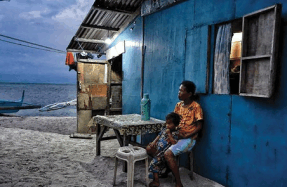The Indian Writer and the Past


NIRAD CHAUDHURI ENJOYED COMPLAINING about his struggles despite a long, outwardly happy and very productive life. He became a full-time writer during the 1950s, when very few Indians wrote “literature” in English. Like their successors, they lacked a significant domestic audience—to be published meant being published abroad. Even in Britain, until the breakthrough success of Midnight’s Children in 1981, books about India usually sold in modest quantities. The best-known “Indian” novels were written by English (or Anglo-Irish) writers like Paul Scott and JG Farrell (who won the Booker Prize in 1973 for the superb The Siege of Krishnapur). Yet Chaudhuri managed to earn his living as a writer—if his books did not make much money, he always found publishers willing to take them. In 1970, he moved with his wife to Oxford, where he spent thirty-odd years, dying at the Biblical age of 101. His last book was published shortly before his hundredth birthday.
His first book came out in 1951, when he was 54. Nearly seventy years later, The Autobiography of an Unknown Indian remains one of the finest books ever written about India. An idiosyncratic mixture of description, memoir, criticism, reportage and historical excavation, it is rooted in Chaudhuri’s lived experience and febrile temperament. On publication, it was feted by a small but influential circle of critics—its later admirers include Doris Lessing, VS Naipaul, Salman Rushdie and Pankaj Mishra. Yet it’s out of print in the United Kingdom; in India, Jaico, an undistinguished publishing house, appears to own the rights to Chaudhuri’s work. In the United States, the New York Review of Books brought out a handsome paperback edition with an introduction by the journalist and critic Ian Jack some years ago.
As a writer, Chaudhuri is all but forgotten in the cultures that shaped him. Quite apart from its literary merit, the Autobiography also sets out some interesting ideas about Indian society and its relation to the West. Chaudhuri failed to develop them, for he had no interest in political economy as such. His primary concern was intellectual culture in its purest sense. From this standpoint, and almost in passing, the Autobiography mounts a scathing attack on the moral hypocrisy of the Bengali middle class (and, by extension, its Indian counterpart). It also makes a penetrating critique of Indian nationalism as it developed during Chaudhuri’s lifetime.
Both criticisms, rejected out of hand when the book was published, appear surprisingly prescient today. They speak to our own time and its intellectual climate: extending and modifying Chaudhuri’s critique allows us to uncover the common ground between the nationalism espoused by Gandhi and Nehru, and the insular, bigoted worldview of the Hindu Right. Despite the very real and irreconcilable differences between them, there is some relation between Nehru and Modi. The rise of the Bharatiya Janata Party from the 1980s—and its forebears before that—did not occur in isolation. It is tied not merely to the failures of Nehruvian nationalism, but to some of its basic assumptions.
CHAUDHURI’S LIFE took a decisive turn in 1920, when, incapacitated by stress, he refused to sit for his MA examination. This failure ended his dreams of an academic career. After this, he worked as a clerk in the military accounts department of the Indian government for some years. The job was obtained in the usual way, by nepotism, on the recommendation of a cousin. Despite all that it promised by way of financial security and status, he threw it up in 1926 to become a jobbing critic and essayist; along the way, he also got married, to a young woman chosen by his father. In 1937, he was offered the position of private secretary to Sarat Chandra Bose, a leading figure (along with his brother Subhas Chandra) in the Bengal Congress. This allowed Chaudhuri to observe the chief actors of the nationalist movement at close quarters, when they visited Calcutta. By this time, he had made a name for himself as a specialist on international affairs and military history, broadcasting reports on the Second World War from the Calcutta station of All India Radio. In 1942, he was appointed to the news division of AIR in Delhi, on a salary of his own naming.
One day in 1947, in the bloody aftermath of Partition, in a city overflowing with refugees and permeated with memories of violence, panic and despair, he suddenly decided to write an autobiography—not just a memoir, but a lasting record of a place, a milieu, and
You’re reading a preview, subscribe to read more.
Start your free 30 days



